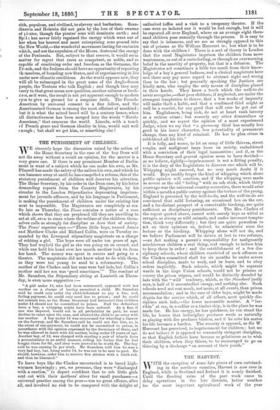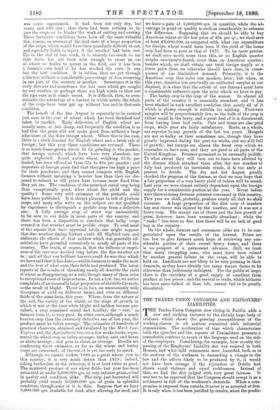THE HARVEST.
WITH the exception of some late pieces of corn outstand- ing in the northern counties, Harvest is now over in England, while in Scotland and Ireland it is nearly finished. Until the flooding rains of the past week came to delay operations in the late districts, better weather for the most important agricultural work of the year
was never experienced. It had been not only dry, but sunny and still also ; thus there had been nothing to in- jure the crops, or to hinder the work of cutting and carting.
These fortunate conditions have been all the more valuable this season, on account of the laid state of a large proportion of the crops, which would have been peculiarly difficult to cut, and especially liable to injury, if the weather had been wet.
Up to the end of last week, it is scarcely too much to say that there has not been rain enough to cause an ear of wheat or barley to sprout in the field, and it has been a farmer's own fault if he has stacked his corn in any but the best condition. It is seldom that we get through a harvest without a considerable per-centage of loss occurring in one part of the country or another. Sometimes it is the early districts and sometimes the late ones which get caught by wet weather, or perhaps there are high winds to blow out the ripe corn as it stands uncut. It is difficult, then, to over- estimate the advantage of a harvest in which nearly the whole of the crops have been got up without loss and in first-rate condition.
The benefit of the fine August is especially to be noticed just now, in the case of wheat which has been thrashed and taken to market. Early deliveries of English wheat are usually more or less damp, and frequently the condition is so bad that the grain will not make good flour without a large admixture of the drier foreign wheat. When this is the case, there is a slack demand for English wheat and a brisk sale of foreign ; but this year these conditions are reversed. There is so much home-grown wheat fit for grinding in the market, that foreign arrivals, which have been very abundant, are quite neglected. Sound native wheat, weighing 6311x per bushel, has been offered at from 37s. to 40s. per quarter ; and importers of foreign grain find that they gave too high a price for their purchases, and they cannot compete with English farmers without incurring a heavier loss than they are dis- posed to submit to till prices have become more fixed than they yet are. The condition of the principal cereal crop being thus exceptionally good, what about the yield and the quality ? Some very wild estimates of the probable yield have been published. It is always pleasant to tell of glorious crops, and many who write on the subject are not qualified by experience to distinguish a prolific crop from a defective one. A fully average crop of straw was undoubtedly to be seen in our fields in most parts of the country, and there has been a disposition to conclude that bulky crops secured in fine weather must be prolific crops. To read most of the reports that have appeared lately, one might suppose that fine weather during harvest could fill blighted ears, and obliterate the effects of that mildew which was generally ad- mitted to have prevailed extensively in nearly all parts of the country. The truth, of course, is that the fullness or empti- ness of the ears was decided long before the fine weather set in ; and all that our brilliant harvest could do was that which we have said that it has done,—enable farmers to make the most and the best of what corn their fields had produced. The latest reports of the results of thrashing nearly all describe the yield of wheat as disappointing, as a rule, though many of them refer to exceptional cases of large returns. In not a few, too, we notice complaints of an unusually large proportion of shrivelled kernels, —the result of blight. There is, in fact, an uncommonly wide divergence of yield on different farms, and even on different fields of the same farm, this year. Where, from the nature of the soil, the variety of the wheat, or the stage of growth in which it was at the time when blight and mildew became pre- valent, a crop remained sound and healthy, the cast," as farmers term it, is very good. In other cases, although a much heavier crop than the extremely defective one of last year, the produce must be below average. The estimates of hundreds of practical observers, obtained and tabulated by the Mark Lane Express and the Agricultural Gazette a few weeks backs, repre- sented the wheat crop as below average ; barley, oats, and beans as above average ; and peas as about an average. Results are confirming these estimates, as far as the wheat and barley crops are concerned ; of the rest, it is yet too early to speak.
Although we cannot reckon 1880 as a great wheat year in this country, it is very much better than 1879; indeed, taking food-value as the criterion, it is at least twice as good. The marketed produce of our wheat fields last year has been estimated at under 6,000,000 qrs. of very inferior grain,—bad in quality and condition alike. The crop just harvested will probably yield nearly 10,000,000 qrs. of grain in splendid condition, though some of it is thin. Suppose that we have 9,000,000 qrs. available for food, after allowing for seed, and we have a gain of 3,000,000 qrs. in quantity, while the ad- vantage in point of quality is such as considerably to enhance the difference. Supposing that we should be able to buy American wheat at the low price of 40s. per qr., we shall save at least £6,000,000, as compared with what our expenditure for foreign wheat would have been if the yield of the home crop had been as poor as that of 1879. To be more precise, we shall save much more than this, as an English quarter weighs one-twenty-fourth more than an American quarter ; besides which, we shall obtain our total foreign supply at a lower price than we otherwise should have done, in conse- quence of our diminished demand. Primarily, it is the American crop that rules our markets here ; but when, as this year, America has practically an unlimited surplus at our disposal, it is clear that the extent of our demand must have a considerable influence upon the price which we have to pay. The barley crop is the crop of the season. In almost all parts of the country it is unusually abundant, and it has been stacked in such excellent condition that nearly all of it which is plump enough is suitable for malting. First-rate samples will be proportionately few, as the bulk of the crop is rather small in the berry, and a great deal of it is discoloured, from having been laid early. Oats and beans are also good crops, while peas are fairly satisfactory. Roots, as a whole, are superior to any growth of the last ten years. Mangels are not so bulky as they sometime& are, though they have greatly improved during the past six weeks, and are still full of growth ; but turnips are almost the finest crop which we remember to have seen, and they are good in all parts of the United Kingdom. Potatoes promised to be unusually prolific. To what extent they will turn out to have been affected by the disease which attacked them after the wet weather of July had produced its inevitable result, it is too early at present to decide. The dry and hot August greatly checked the progress of the disease, so that we may hope that a fair proportion of a very heavy yield of tubers will be sound. Last year we were almost entirely dependent upon the foreign supply for a considerable portion of the year. Never before were there so many German potatoes consumed in this country. This year we shall, probably, produce nearly all that we shall consume. A large proportion of the first crop of meadow hay and clover was injured by the weather, and it was not a heavy crop. The second out of clover and the late growth of grass, however, have been unusually abundant ; while the " make " has been so fine, that there will be no lack of good hay in the country.
On the whole, farmers and consumers alike are to be con- gratulated upon the results of the harvest. Prices are too low to give farmers much hope of retrieving any con- siderable portion of their recent heavy losses, and there is no prospect of a permanent advance. Still, we trust that many struggling men, who must have been ruined by another general failure in the crops, will be able to hold on. Landlords are not likely to be very pressing in their demands, as they have already too many vacant farms to be otherwise than judiciously indulgent. For the public at large, there is the certainty of a good supply of excellent farm produce at low prices ; and the revival in trade, which hitherto has been more talked of than felt, cannot fail to be greatly stimulated.



































 Previous page
Previous page